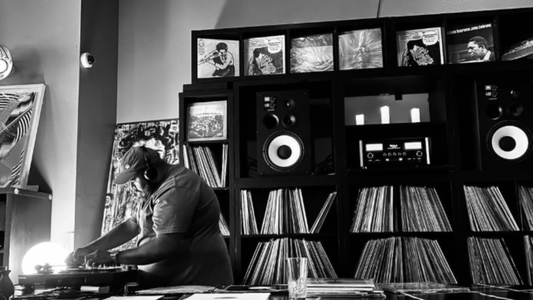
The Funk Awakening
Parliament and Funkadelic — music that moves, bends, and reminds us that joy, imperfection, and groove are all part of deep listening.
By Rafi Mercer
I woke up today listening for a different sound. Not the quiet, patient tones I usually reach for in the morning — something else entirely. I didn’t know what I was searching for, but my mind, as it often does, went wandering before I even made coffee. There it was — that memory — of being completely gripped by two groups that defined my sense of musical curiosity years ago: Parliament and Funkadelic.
It’s funny how memory works through sound. You don’t think your brain is keeping score, but it’s all there — the grooves, the grit, the joy, the absolute absurdity of it all. When I first discovered those records, I didn’t fully understand what I was hearing. I just knew it moved differently. George Clinton’s Parliament was like science fiction made audible, while Funkadelic was philosophy disguised as funk. The two blurred together in a way that defied category — rock, gospel, soul, jazz, psychedelia — all colliding, unapologetically.

If Miles Davis built jazz that expanded your mind, Parliament built funk that exploded it. It was the sound of imagination let loose — rubbery basslines, cosmic horns, voices stacked like galaxies. Listening again this morning, it felt like a reminder of something I’d forgotten: music can be serious and ridiculous at the same time. It can be art and chaos, groove and protest, elegance and sweat.
I put on Mothership Connection and that opening monologue still made me smile — that blend of theatre and groove that no one else quite managed to replicate. You can hear the laughter behind the microphone, the cosmic mischief. There’s a kind of joy in that — musicians unbothered by rules, pushing every sound as far as it would go. Funkadelic’s Maggot Brain, by contrast, is pure emotion — the sound of the soul stretched to breaking point. Eddie Hazel’s guitar solo remains one of the most moving pieces of recorded music ever made. It doesn’t just play; it pleads.
What struck me, listening again, was how physical it all is. You can feel the funk before you understand it. The low end doesn’t just vibrate through the floor — it rearranges something in you. That’s why these records belong in any serious listening bar. They’re built for rooms that can handle them. Good sound systems don’t just reproduce Parliament or Funkadelic — they reveal the architecture of their madness.
I think that’s what I was looking for this morning: not perfection, but movement. A reminder that listening can be messy, ecstatic, human. That sometimes you don’t need a clean sound — you need a true one.
If you’ve never gone down the Parliament-Funkadelic rabbit hole, I recommend it. Start with Mothership Connection or One Nation Under a Groove — albums that sound like freedom itself. Listen not for clarity but for intention. Behind the layers, there’s a band saying something vital: joy is a form of resistance.
It’s easy, in the modern listening world, to chase purity — high-resolution files, pristine playback, minimalist mixes. But funk teaches something else: imperfection has power. The best grooves are slightly off-centre. The best sounds breathe.
So maybe that’s why my brain reached for it this morning — a reminder that music isn’t meant to be tidy. It’s meant to make you feel.
As the record spun and the coffee cooled, I felt that spark again — the same one I felt years ago in a Virgin Megastore, watching people light up when a bassline hit just right. Maybe that’s what Tracks & Tales is for: to help us remember that music doesn’t just belong in quiet rooms of contemplation, but also in the messy, joyful, unpredictable corners of life.
The funk isn’t gone. It just waits for you to listen differently.
Rafi Mercer writes about the spaces where music matters.
For more stories from Tracks & Tales, subscribe, or click here to read more.














